Charles E W Bean, Diaries, AWM38 3DRL 606/97/1 - January - February 1918 - Part 1
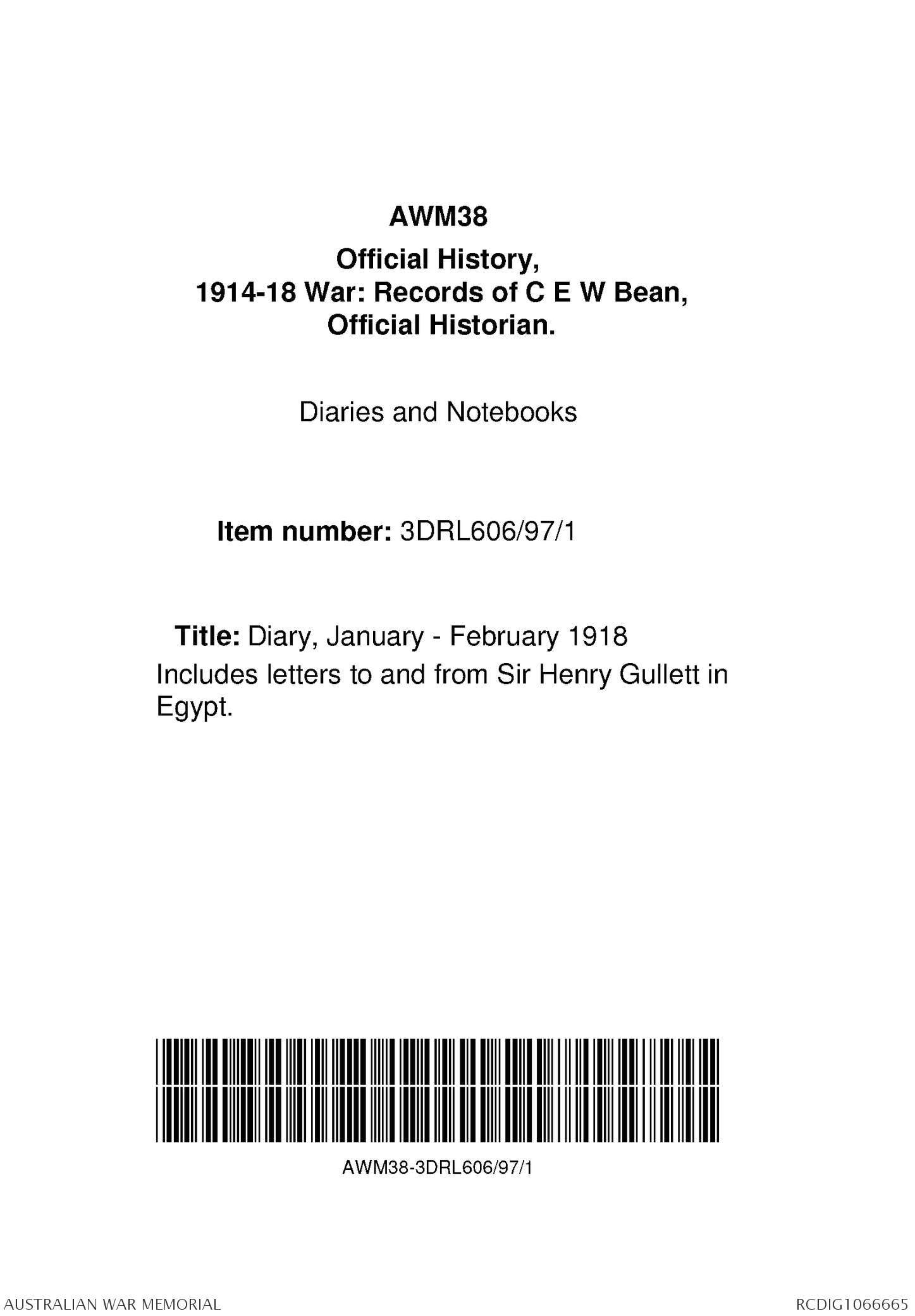
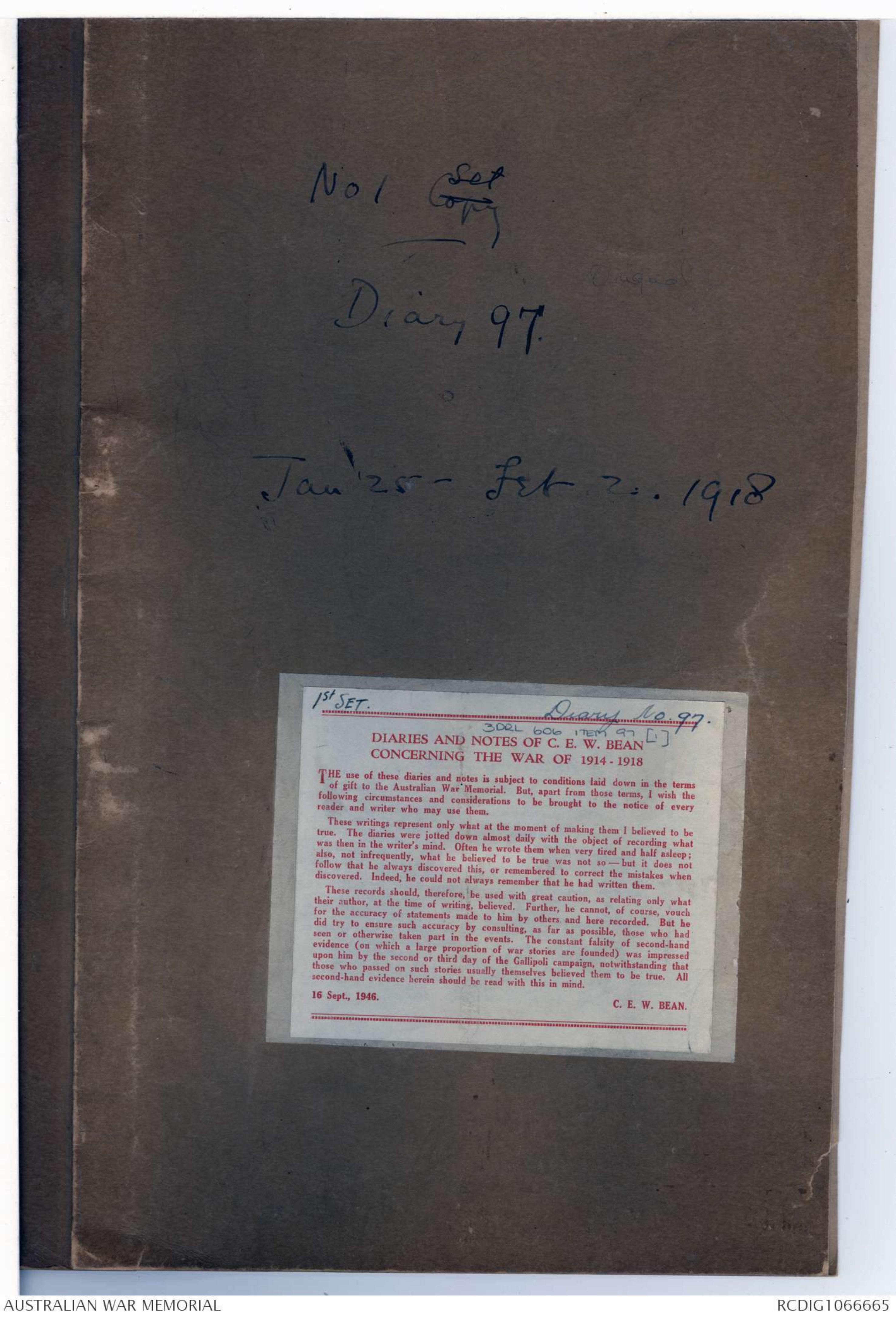
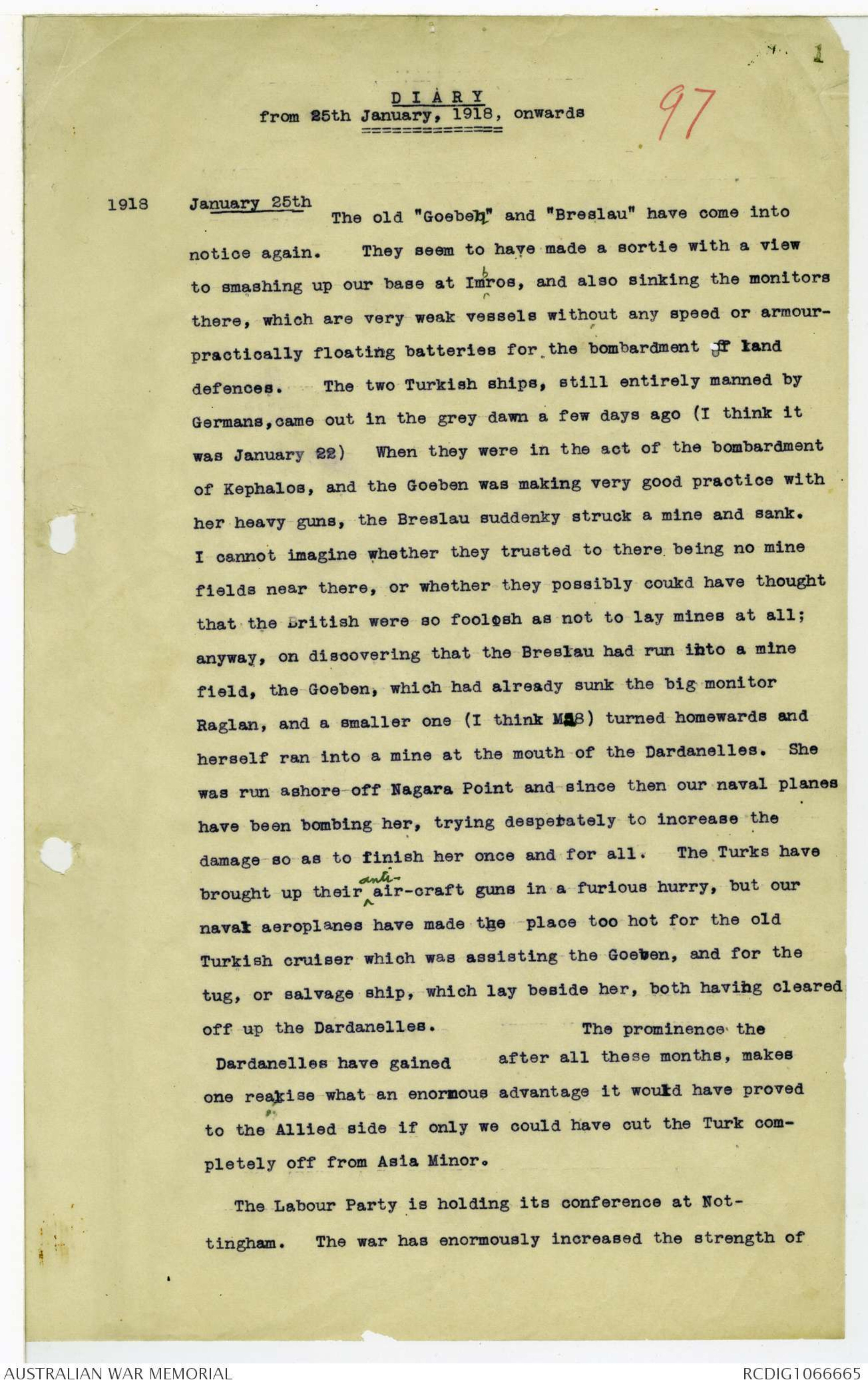
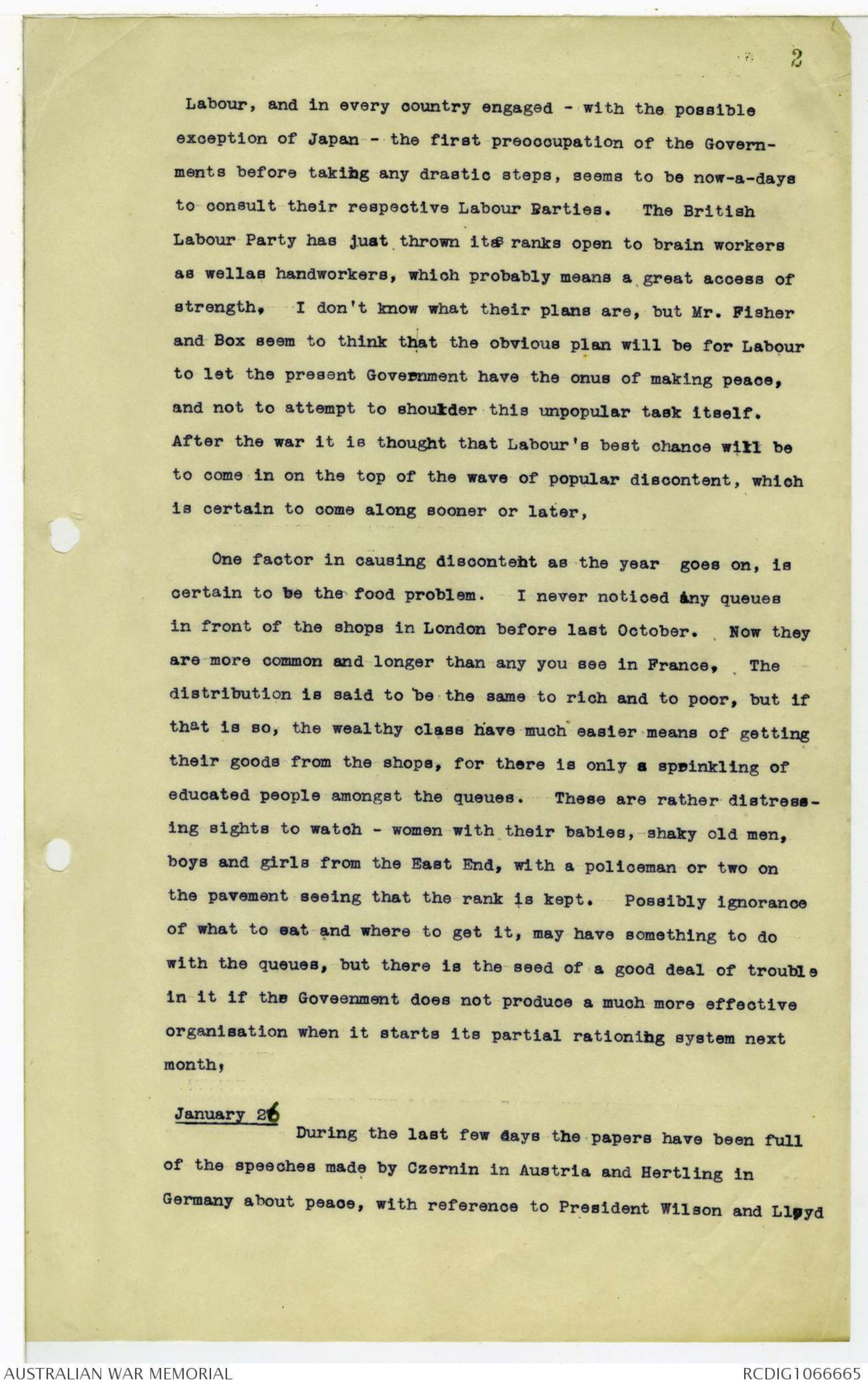
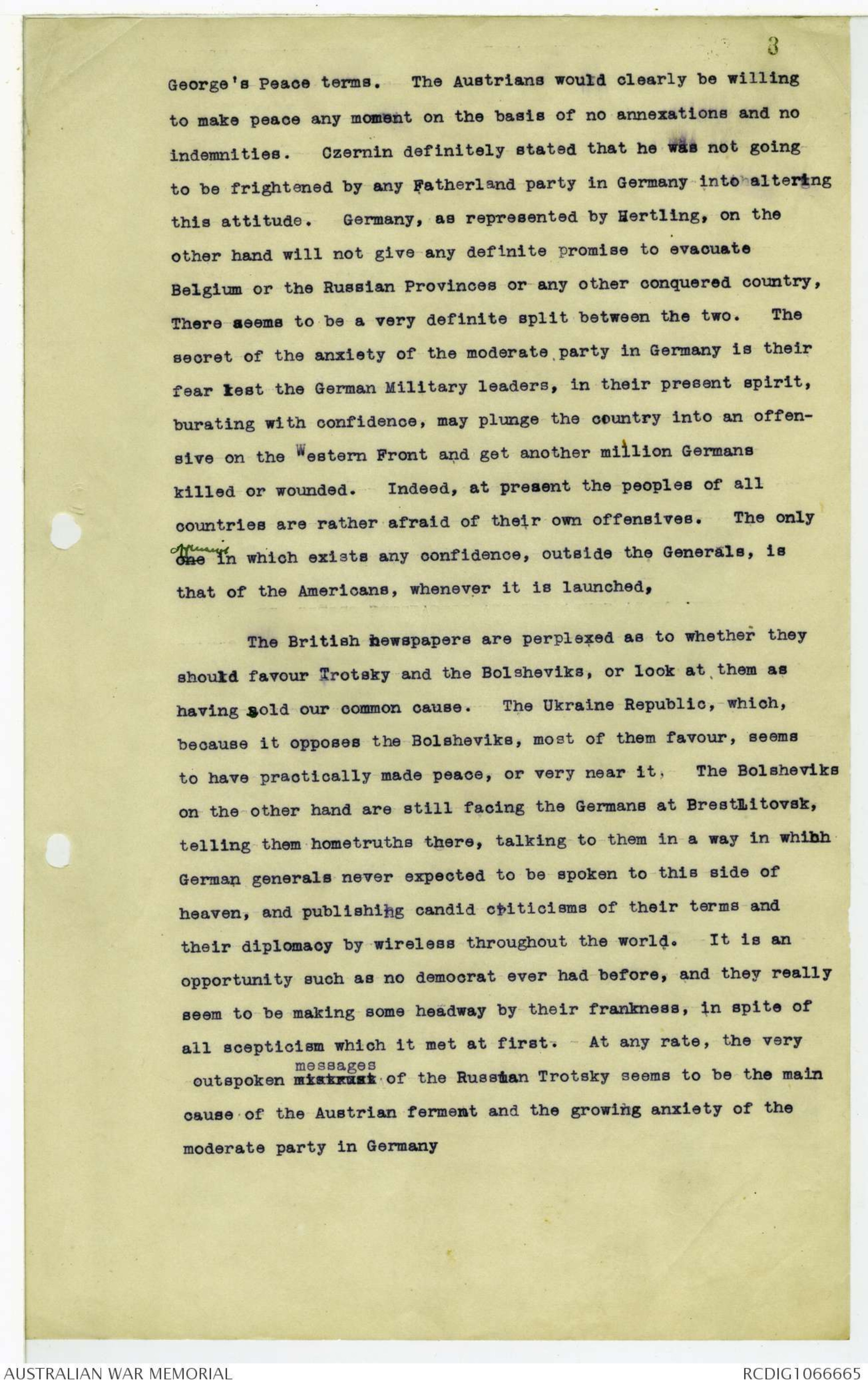
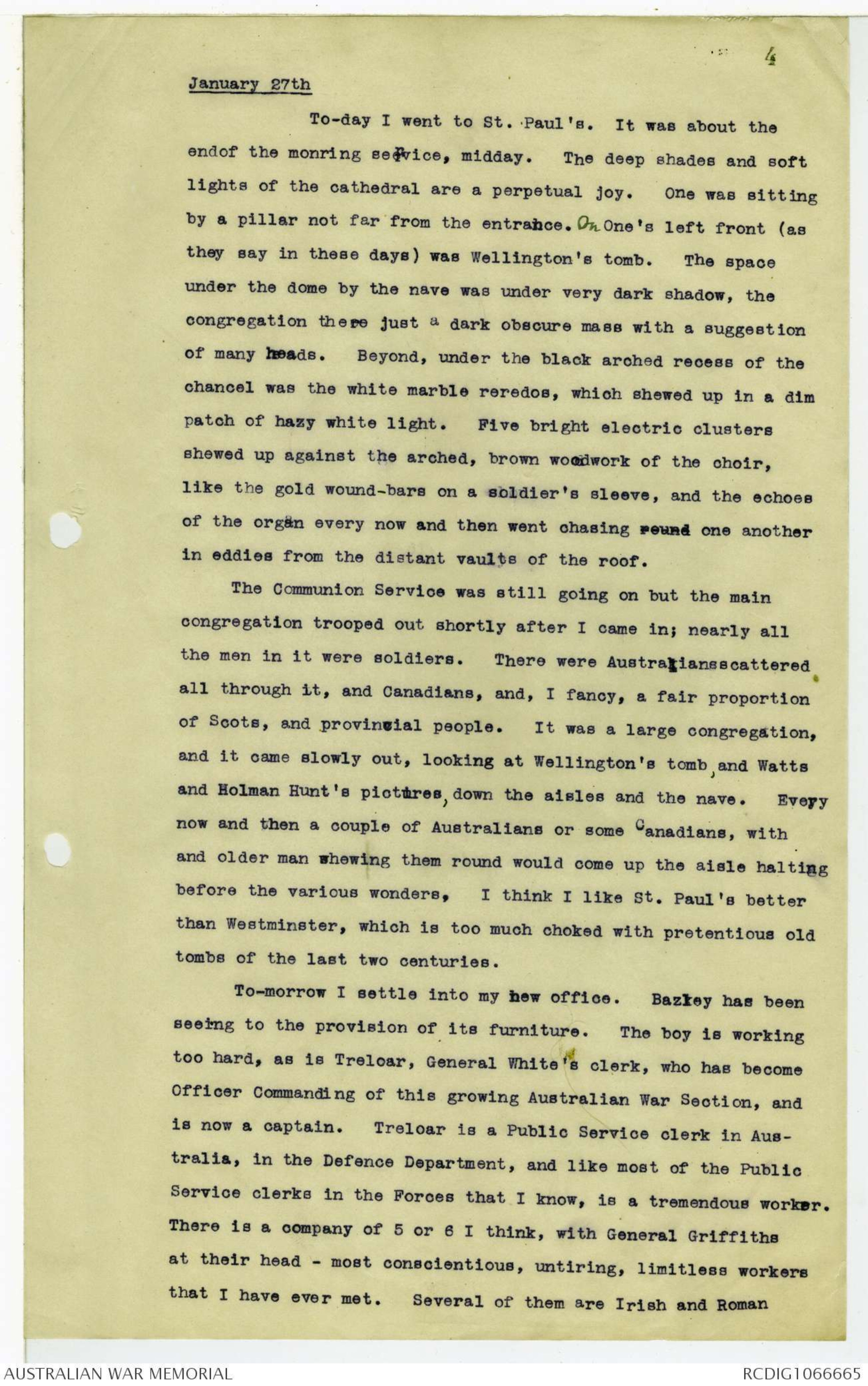
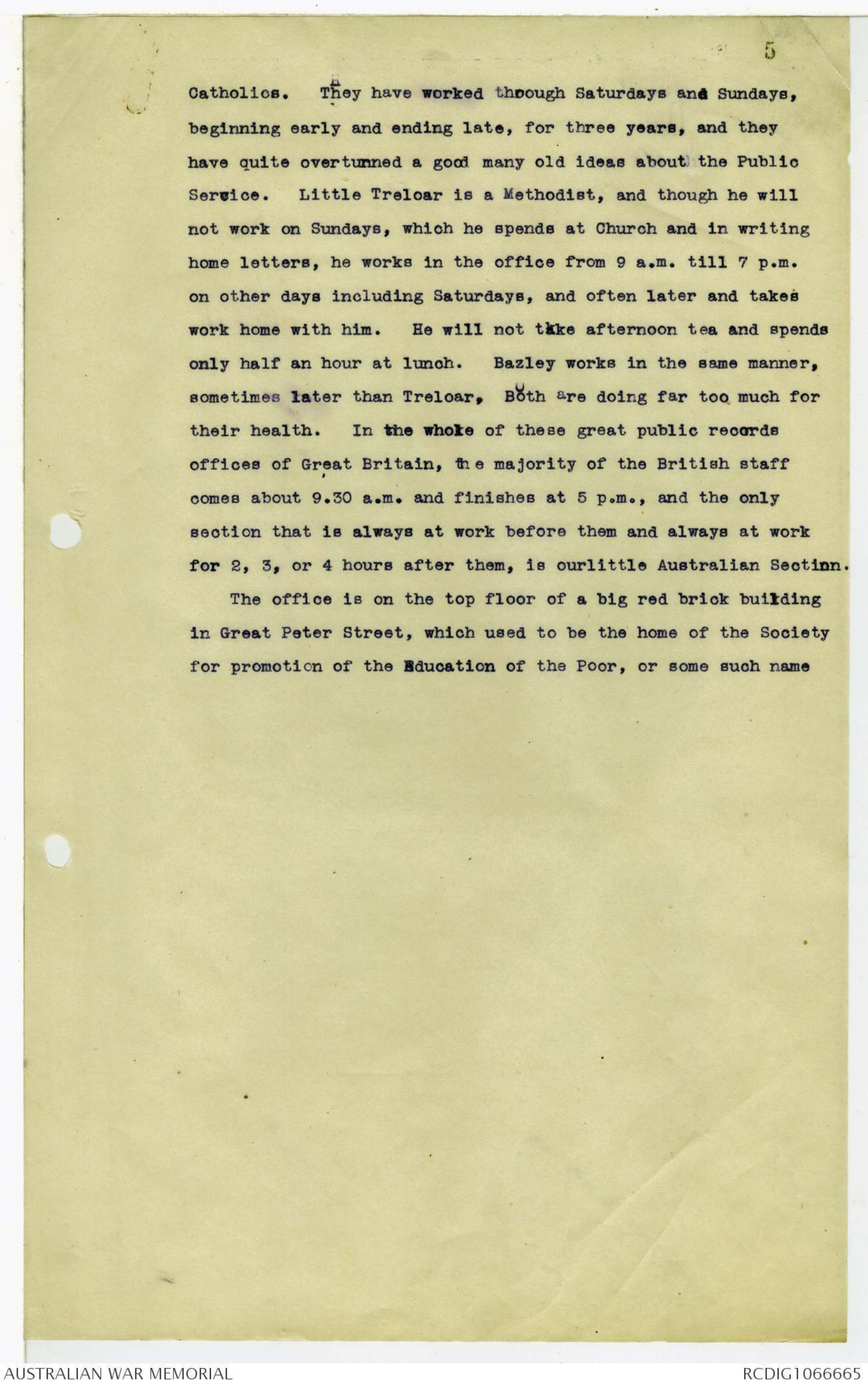
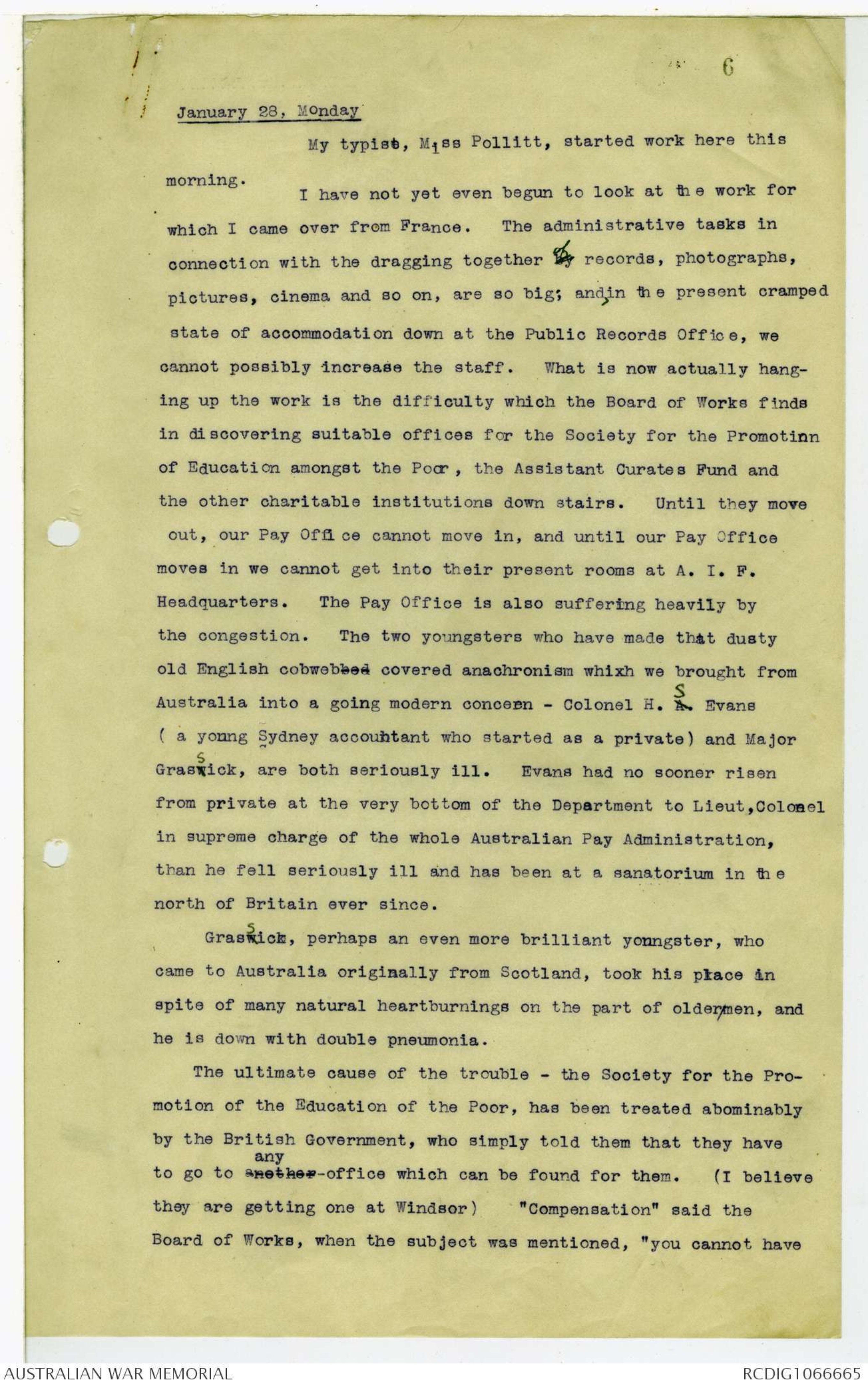
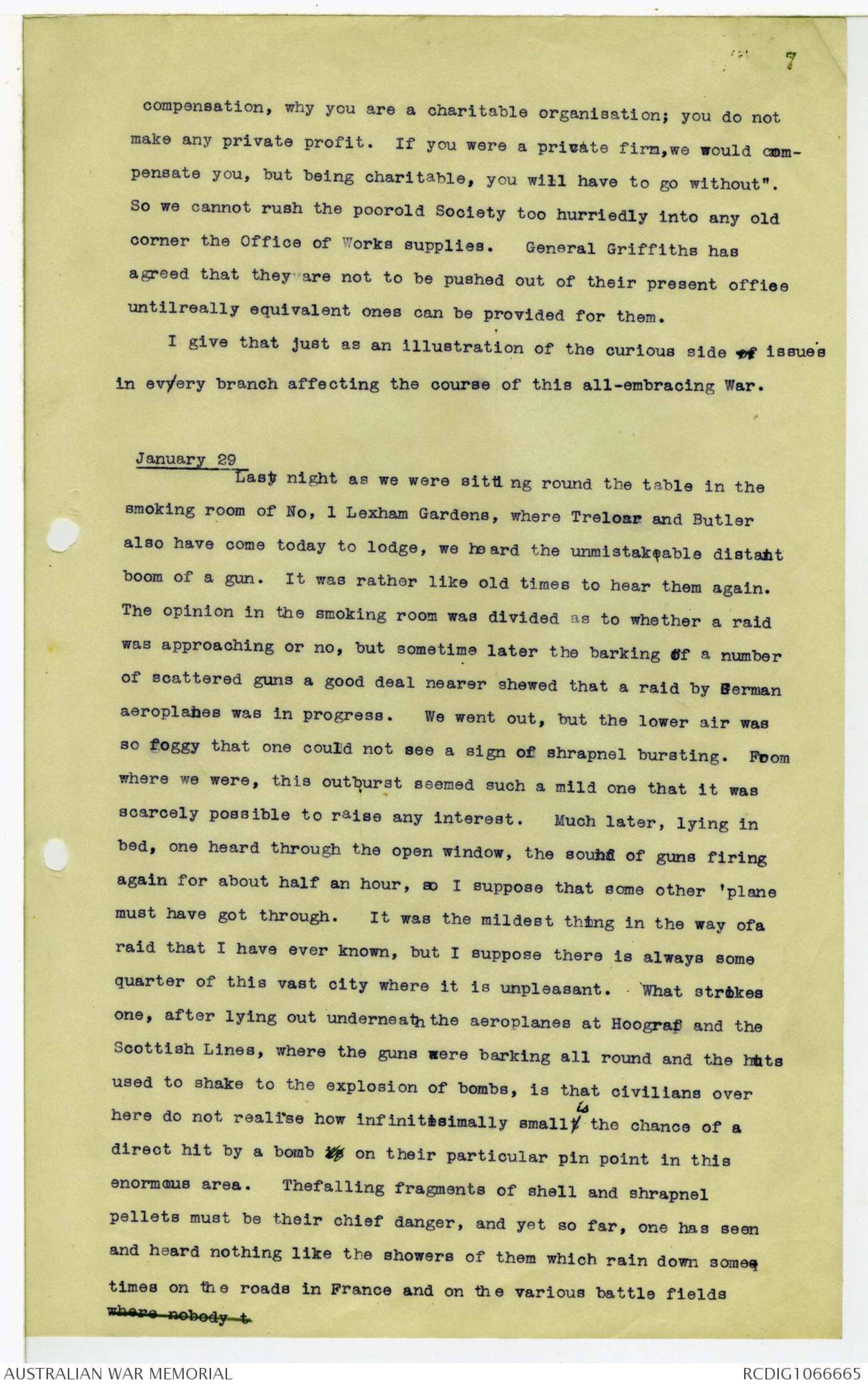
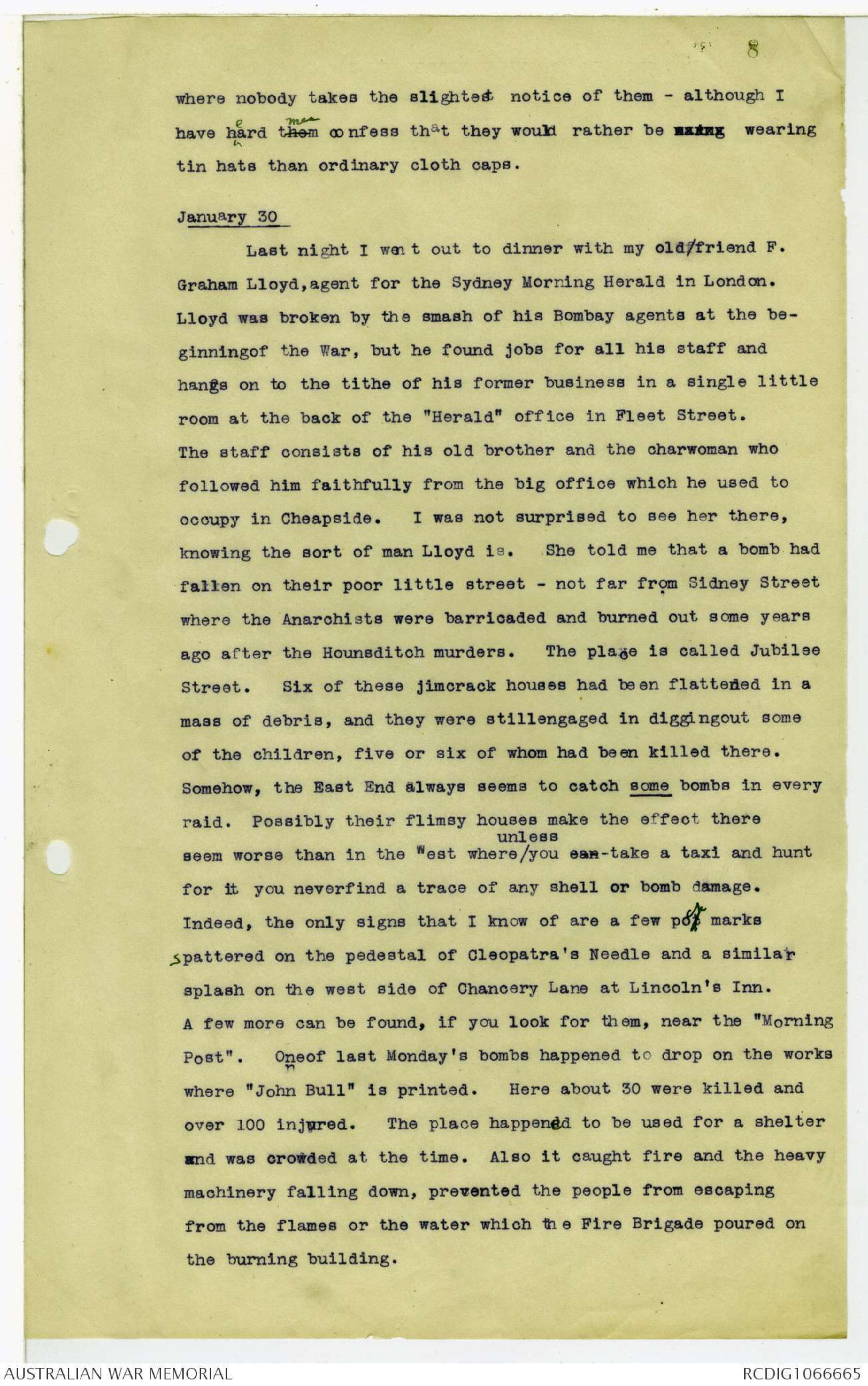
AWM38
Official History,
1914-18 War: Records of C E W Bean,
Official Historian.
Diaries and Notebooks
Item number: 3DRL606/97/1
Title: Diary, January - February 1918
Includes letters to and from Sir Henry Gullett in
Egypt.
AWM38-3DRL606/97/1
No 1 Copy Set
Diary 97
Jan '25 - Feb 2. 1918
1st Set
Diary No 97
3DRL 606 Item 97 [1]
DIARIES AND NOTES OF C.E.W. BEAN
CONCERNING THE WAR OF 1914 - 1918
THE use of these diaries and notes is subject to conditions laid down in the terms
of gift to the Australian War Memorial. But apart from these terms, I wish the
following circumstances and considerations to be brought to the notice of every
reader and writer who may use them.
These writings represent only what at the moment of making them I believed to be
true. The diaries were jotted down almost daily with the object of recording what
was then in the writer's mind. Often he wrote them when very tired and half asleep;
also, not infrequently what he believed to be true was not so - but it does not
follow that he always discovered this, or remembered to correct the mistakes when
discovered. Indeed, he could not always remember that he had written them.
These records should therefore, be used with great caution, as relating only what
their author, at the time of writing believed. Further, he cannot, of course vouch
for the accuracy of statements made to him by others and here recorded. But he
did try to ensure such accuracy by consulting, as far as possible, those who had
seen or otherwise taken part in the events. The constant falsity of second-hand
evidence (on which a large proportion of war stories are founded) was impressed
upon him by the second or third day of the Gallipoli campaign, notwithstanding that
those who passed on such stories usually themselves believed them to be true. All
second-hand evidence herein should be read with this in mind.
16 Sep., 1946. C.E.W. BEAN
1
97
D I A R Y
from 25th January , 1918, onwards
1918 January 25th
The old ''Goeben'' and "Breslau'' have come into
notice again . They seem to have made a sortie with a view
to smashing up our base at Imbros , and also sinking the monitors
there , which are very weak vessels without any speed or armour-
practically floating batteries for the bombardment off land
defences . The two Turkish ships, still entirely manned by
Germans , came out on the grey dawn a few days ago ( I think it
was January 22) When they were in the act of the bombardment
of Kephalos , and the Goeben was making very good practice with
her heavy guns , the Breslau suddenky struck a mine sank .
I cannot imagine whether they trusted to there being no mine
fields near there , or whether they possibly coukd have thought
that the British were so foolish as not to lay mines at all ;
anyway, on discovering that the Breslau had run into a mine
field , the Goeben , which had already sunk the big monitor
Raglan , and a smaller one ( i think [[M28?]]) turned homewards and
herself ran into a mine at the mouth of the Dardanelles. She
was run ashore off Nagara point and since then our naval planes
have been bombing her, trying desperately to increase the
damage so as to finish her once and for all. The Turks have
brought up their ^anti air-craft guns in a furious hurry, but our
naval aeroplanes have made the place too hot for the old
Turkish cruiser which was assisting the Goeben, and for the
tug, or salvage ship, which lay beside her, both having cleared
off up the Dardanelles. The prominence the
Dardanelles have gained after all these months, makes
one reakise what an enormous advantage it would have proved
to the Allied side if only we could have cut the Turk completely
off from Asia Minor .
The Labour Party is holding its conference at Nottingham.
The war has enormously increased the strength of
2
Labour, and in every country engaged - with the possible
exception of Japan- the first preoccupation of the Governments
before taking any drastic steps, seems to be now-a-days
to consult their respective Labour Parties. The British
Labour Party has just thrown its ranks open to brain workers
as wellas handworkers, which probably means a great access of
strength. I don't know what their plans are, but Mr. Fisher
and Box seem to think that the obvious plan will be for Labour
to let the present Government have the onus of making peace,
and not to attempt to shoulder this unpopular task itself.
After the war it is thought that Labour's best chance will be
to come in on the top of the wave of popular discontent, which
is certain to come along sooner or later,
One factor in causing discontent as the year goes on, is
certain to be the food problem. I never noticed any queues
in front of the shops in London before last October. Now they
are more common and longer than any you see in France, The
distribution is said to be the same to rich and to poor, but if
that is so, the wealthy class have much easier means of getting
their goods from the shops, for there is only a sprinkling of
educated people amongst the queues. These are rather distressing
sights to watch - women with their babies, shaky old men,
boys and girls from the East End, with a policeman or two on
the pavement seeing that the rank is kept. Possibly ignorance
of what to eat and where to get it, may have something to do
with the queues, but there is the seed of a good deal of trouble
in it if the Government does not produce a much more effective
organisation when it starts its partial rationing system next month,
January 26
During the last few days the papers have been full
of the speeches made by Czernin in Austria and Hertling in
Germany about peace, with reference to President Wilson and Lloyd
3
George's Peace terms. The Austrians would clearly be willing
to make peace any moment on the basis of no annexations and no
indemnities. Czernin definitely stated that he was not going
to be frightened by any Fatherland party in Germany into altering
this attitude. Germany, as represented by Hertling, on the
other hand will not give any definite promise to evacuate
Belgium or the Russian Provinces or any other conquered country,
There seems to be a very definite split between the two. The
secret of the anxiety of the moderate party in Germany is their
fear lest the German Military leaders, in their present spirit,
bursting with confidence, may plunge the country into an offensive
on the Western Front and get another million Germans
killed or wounded. Indeed, at present the peoples of all
countries are rather afraid of their own offensives. The onlyone offensive in which exists any confidence, outside the Generals, is
that of the Americans, whenever it is launched,
The British newspapers are perplexed as to whether they
should favour Trotsky and the Bolsheviks, or look at them as
having sold our common cause. The Ukraine Republic, which,
because it opposes the Bolsheviks, most of them favour, seems
to have practically made peace, or very near it, The Bolsheviks
on the other hand are still facing the Germans at Brestlitovsk,
telling them hometruths there, talking to them in a way in which
German generals never expected to be spoken to this side of
heaven, and publishing candid criticisms of their terms and
their diplomacy by wireless throughout the world. It is an
opportunity such as no democrat ever had before, and they really
seem to be making some headway by their frankness, in spite of
all scepticism which it met at first. - At any rate, the very
outspoken xxxxx messages of the Russian Trotsky seems to be the main
cause of the Austrian ferment and the growing anxiety of the
moderate party in Germany
4
January 27th
To-day I went to St. Paul's. It was about the
endof the morning service, midday. The deep shades and soft
lights of the cathedral are a perpetual joy. One was sitting
by a pillar not far from the entrance. On One's left front (as
they say in these days) was Wellington's tomb. The space
under the dome by the nave was under very dark shadow, the
congregation there just a dark obscure mass with a suggestion
of many heads. Beyond, under the black arched recess of the
chancel was the white marble reredos, which shewed up in a dim
patch of hazy white light. Five bright electric clusters
shewed up against the arched, brown woodwork of the choir,
like the gold wound-bars on a soldier's sleeve, and the echoes
of the organ every now and then went chasing round one another
in eddies from the distant vaults of the roof.
The Communion Service was still going on but the main
congregation trooped out shortly after I came in; nearly all
the men in it were soldiers. There were Australiansscattered
all through it, and Canadians, and, I fancy, a fair proportion
of Scots, and provincial people. It was a large congregation,
and it came slowly out, looking at Wellington's tomb , and Watts
and Holman Hunt's pictures, down the aisles and the nave. Every
now and then a couple of Australians or some Canadians, with
and older man shewing them round would come up the aisle halting
before the various wonders, I think I like St. Paul's better
than Westminster, which is too much choked with pretentious old
tombs of the last two centuries.
To-morrow I settle into my new office. Bazley has been
seeing to the provision of its furniture. The boy is working
too hard, as is Treloar, General White's clerk, who has become
Officer Commanding of this growing Australian War Section, and
is now a captain. Treloar is a Public Service clerk in Australia,
in the Defence Department, and like most of the Public
Service clerks in the Forces that I know, is a tremendous worker.
There is a company of 5 or 6 I think, with General Griffiths
at their head - most conscientious, untiring, limitless workers
that I have ever met. Several of them are Irish and Roman
5
Catholics. They have worked through Saturdays and Sundays,
beginning early and ending late, for three years, and they
have quite overtunned a good many old ideas about the Public
Service. Little Treloar is a Methodist, and though he will
not work on Sundays, which he spends at Church and in writing
home letters, he works in the office from 9 a.m. till 7 p.m.
on other days including Saturdays, and often later and takes
work home with him. He will not take afternoon tea and spends
only half an hour at lunch. Bazley works in the same manner
sometimes later than Treloar, Both are doing far too much for
their health. In the whole of these great public records
offices of Great Britain, the majority of the British staff
comes about 9.30 a.m. and finishes at 5 p.m., and the only
section that is always at work before them and always at work
for 2, 3, or 4 hours after them, is ourlittle Australian Section.
The office is on the top floor of a big red brick building
in Great Peter Street, which used to be the home of the Society
for promotion of the Education of the Poor, or some such name
6
January 28, Monday
My typist, Miss Pollitt, started work here this
morning.
I have not yet even begun to look at the work for
which I came over from France. The administrative tasks in
connection with the dragging together by of records, photographs,
pictures, cinema and so on, are so big; and,in the present cramped
state of accommodation down at the Public Records Office, we
cannot possibly increase the staff. What is now actually hanging
up the work is the difficulty which the Board of Works finds
in discovering suitable offices for the Society for the Promotion
of Education amongst the Poor, the Assistant Curates Fund and
the other charitable institutions down stairs. Until they move
out, our Pay Office cannot move in, and until our Pay Office
moves in we cannot get into their present rooms at A. I. F.
Headquarters. The Pay Office is also suffering heavily by
the congestion. The two youngsters who have made that dusty
old English cobwebbed covered anachronism whixh we brought from
Australia into a going modern concern - Colonel H. A. S Evans
(a young Sydney accountant who started as a private) and Major
Grasswick, are both seriously ill. Evans had no sooner risen
from private at the very bottom of the Department to Lieut,Colonel
in supreme charge of the whole Australian Pay Administration,
than he fell seriously ill and has been at a sanatorium in the
north of Britain ever since.
Grasswick, perhaps an even more brilliant youngster, who
came to Australia originally from Scotland, took his place in
spite of many natural heartburnings on the part of older/men, and
he is down with double pneumonia.
The ultimate cause of the trouble - the Society for the Promotion
of the Education of the Poor, has been treated abominably
by the British Government, who simply told them that they have
to go to another any office which can be found for them. (I believe
they are getting one at Windsor) "Compensation" said the
Board of Works, when the subject was mentioned, "you cannot have
7
compensation, why you are a charitable organisation; you do not
make any private profit. If you were a private firm, we would compensate
you, but being charitable, you will have to go without".
So we cannot rush the poorold Society too hurriedly into any old
corner the Office of Works supplies. General Griffiths has
agreed that they are not to be pushed out of their present office
untilreally equivalent ones can be provided for them.
I give that just as an illustration of the curious side of issues
in evvery branch affecting the course of this all-embracing War.
January 29
Last night as we were sitting round the table in the
smoking room of No, 1 Lexham Gardens, where Treloar and Butler
also have come today to lodge, we heard the unmistakeable distant
boom of a gun. It was rather like old times to hear them again.
The opinion in the smoking room was divided as to whether a raid
was approaching or no, but sometime later the barking of a number
of scattered guns a good deal nearer shewed that a raid by German
aeroplanes was in progress. We went out, but the lower air was
so foggy that one could not see a sign of shrapnel bursting. From
where we were, this outburst seemed such a mild one that it was
scarcely possible to raise any interest. Much later, lying in
bed, one heard through the open window, the sound of guns firing
again for about half an hour, so I suppose that some other 'plane
must have got through. It was the mildest thing in the way ofa
raid that I have ever known, but I suppose there is always some
quarter of this vast city where it is unpleasant. What strikes
one, after lying out underneath the aeroplanes at Hoograf and the
Scottish Lines, where the guns were barking all round and the huts
used to shake to the explosion of bombs, is that civilians over
here do not realise how infinitesimally smallt is the chance of a
direct hit by a bomb in on their particular pin point in this
enormous area. Thefalling fragments of shell and shrapnel
pellets must be their chief danger, and yet so far, one has seen
and heard nothing like the showers of them which rain down somes
times on the roads in France and on the various battle fieldswhere nobody t
8
where nobody takes the slightest notice of them - although I
have h^eard them men confess that they would rather be xxxxx wearing
tin hats than ordinary cloth caps.
January 30
Last night I wen t out to dinner with my old/friend F.
Graham Lloyd,agent for the Sydney Morning Herald in London.
Lloyd was broken by the smash of his Bombay agents at the beginningof
the War, but he found jobs for all his staff and
hangs on to the tithe of his former business in a single little
room at the back of the "Herald" office in Fleet Street.
The staff consists of his old brother and the charwoman who
followed him faithfully from the big office which he used to
occupy in Cheapside. I was not surprised to see her there,
knowing the sort of man Lloyd is. She told me that a bomb had
fallen on their poor little street - not far from Sidney Street
where the Anarchists were barricaded and burned out some years
ago after the Hounsditch murders. The place is called Jubilee
Street. Six of these jimcrack houses had been flattened in a
mass of debris, and they were stillengaged in diggingout some
of the children, five or six of whom had been killed there.
Somehow, the East End always seems to catch some bombs in every
raid. Possibly their flimsy houses make the effect there
seem worse than in the west where /unless you can-take a taxi and hunt
for it you neverfind a trace of any shell or bomb damage.
Indeed, the only signs that I know of are a few potck marks
spattered on the pedestal of Cleopatra's Needle and a similar
splash on the west side of Chancery Lane at Lincoln's Inn.
A few more can be found, if you look for them, near the "Morning
Post". Oneof last Monday's bombs happened to drop on the works
where "John Bull" is printed. Here about 30 were killed and
over 100 injured. The place happened to be used for a shelter
and was crowded at the time. Also it caught fire and the heavy
machinery falling down, prevented the people from escaping
from the flames or the water which the Fire Brigade poured on
the burning building.
 Sam scott
Sam scottThis transcription item is now locked to you for editing. To release the lock either Save your changes or Cancel.
This lock will be automatically released after 60 minutes of inactivity.